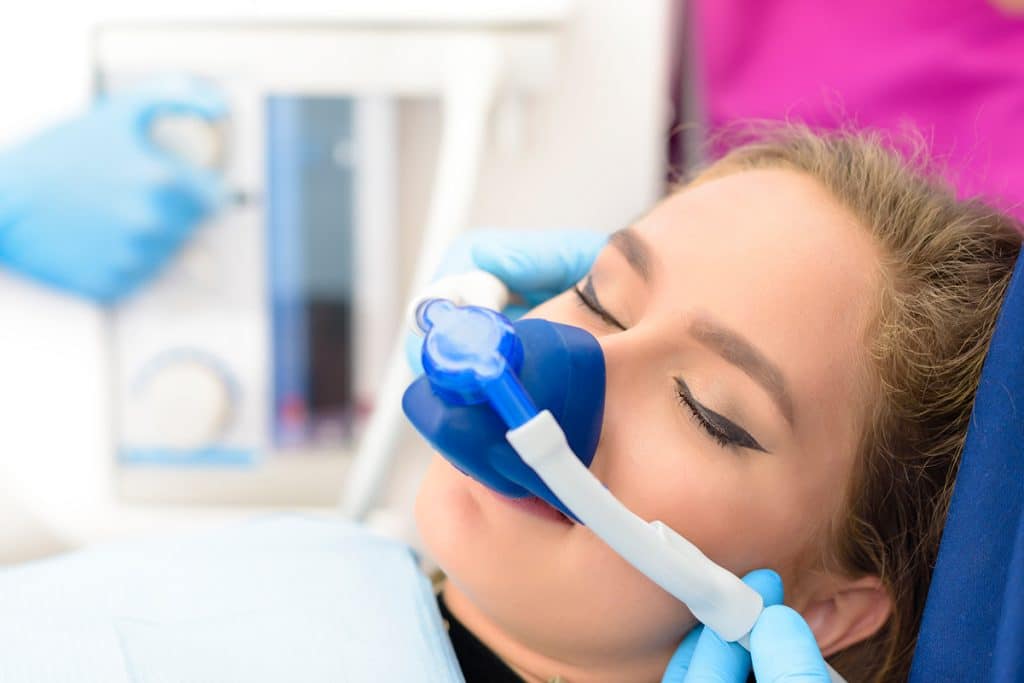What Are The Different Types of Dental Anesthesia?

Oral and Maxillofacial Surgeons are uniquely trained alongside anesthesiologists and in the Medical and Surgical Intensive Care Units during their residency making them the only surgical specialist that is also trained and licensed to provide in-office intravenous and inhalational anesthesia for patient care. The overall goal of anesthesia is to help to reduce anxiety and maximize comfort during surgical procedures.
If you or a loved one has an upcoming oral surgery procedure, you may have some questions about anesthesia, such as what type will be used, whether or not it is safe, and what to expect. Here’s what you need to know.
Types of Dental Anesthesia
There are 4 main types of anesthesia used for oral surgery:
- Local Anesthesia. Local anesthesia temporarily blocks nerve transmission in the part of the mouth where the surgery will take place. Lidocaine is typically used and it creates a numb feeling around the area where it is injected. It takes effect anywhere from 5 to 20 minutes after administration and may take a few hours to wear off after the procedure. Patients tolerate many procedures quite well with Local Anesthesia.
- Nitrous Oxide. Nitrous oxide is sometimes referred to as “laughing gas” and is an inhalational analgesic gas provided with oxygen that the patient breathes through a mask worn over the nose. After just a few minutes of breathing nitrous oxide, patients will feel calm and relaxed. In some cases patients describe a heavy feeling in their arms and legs and a tingling sensation in their face and extremities. Nitrous Oxide is regarded as a very safe and effective means of anxiety relief and the effects wear off in just a few minutes after it is discontinued.
- IV Sedation. IV Sedation is also referred to as Conscious Sedation, Monitored Anesthesia Care and most accurately described as Minimal, Moderate, or Deep Sedation. Intravenously administered sedatives are an excellent means of fear relief and analgesia undergoing any type of oral surgery procedure. Medication can be administered intravenously to achieve varying levels of sedation from mild to moderate to deep sedation. While under IV sedation, patients are still technically conscious and responsive, but they most likely will not remember anything about the procedure afterwards.
- General Anesthesia. General anesthesia induces a sleep-like state with the patient fully unconscious and unresponsive to stimulus. Anesthetic medications are administered intravenously (through an I.V.) and inhalational medication (inhaled through a mask) may also be administered. General anesthesia is often performed with the aid of an airway supportive device such as a Laryngeal Mask Airway (LMA) or an endotracheal tube (ET Tube), placed after you are asleep, to help you breathe safely during the procedure. Patients receiving general anesthesia are continuously monitored with a pulse oximeter, blood pressure cuff, an EKG, and capnography throughout the procedure.
Are All Types of Anesthesia Safe?
All of the types of anesthesia we offer are completely safe for most patients. All patients receiving treatment and anesthesia services at Lucca Oral and Facial Surgery must first visit for a physical exam and complete review of medical history. Consultation with the patient’s primary care physician is sometimes required.
Does General Anesthesia Require a Hospital Stay?
General anesthesia provided for oral surgery services that can be provided in the office are most often provided as an in-office outpatient ambulatory service. In-patient hospital stays are not a condition of receiving anesthesia for elective in-office procedures. Patients may be referred to a hospital for care if determined necessary due to complexity of health or of the procedure required.
Can I Drive After Anesthesia?
After IV sedation and general anesthesia, you can not operate a vehicle. On the day of your procedure, you will need a trusted able bodied family member or friend over the age of 18 to drive you home.
Schedule an Oral Surgery Consultation Today
Lucca Oral and Facial Surgery provides a wide variety of oral surgery procedures and anesthesia options. Together we will discuss your needs and preferences to determine the best type of anesthesia for your procedure. Our goal is to make sure you are as comfortable as possible, before, during, and after surgery.
To learn more, call 617-300-0345 or contact us today to schedule an appointment.






